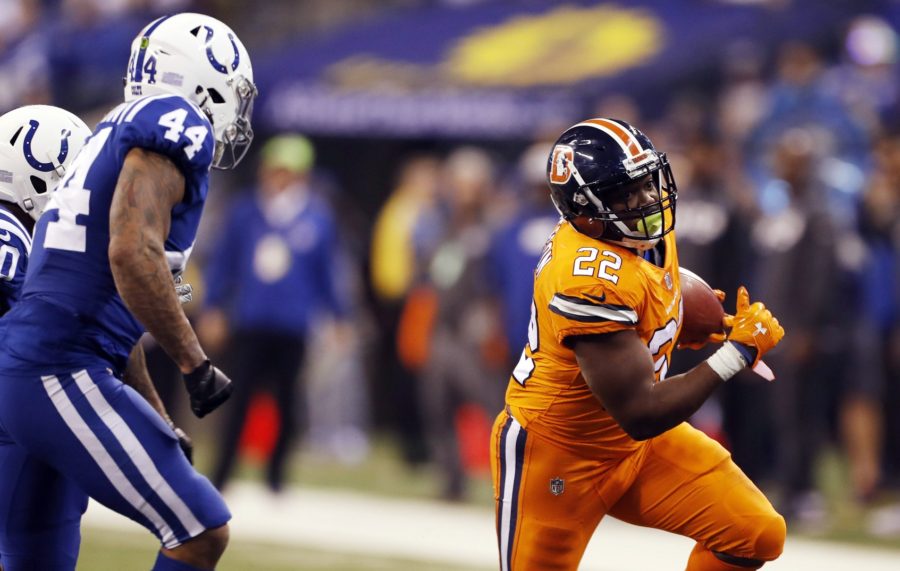Despite falling behind by two scores early, the Denver Broncos managed to stick to their run-first gameplan, allowing them to overtake the Indianapolis Colts for their second win in five days, and their first back-to-back wins since the beginning of the season.
Thursday marked the fifth time this season that the Broncos have run more than they have thrown the ball. All five times they have, they’ve won. That’s not unusual; teams that can keep the ball on the ground usually win in the NFL; running preserves leads, lowers turnover risk and eats the clock.
What is impressive for the Broncos is the manner in which they did it. Despite being down two scores, offensive coordinator Bill Musgrave and the team stuck to their guns, putting the ball in hands of running backs C.J. Anderson and Devontae Booker; allowing them to gallop to victory rather than placing their faith in the arms of their quarterbacks.
The Broncos have said that they’ve wanted to play this way all season, but they either didn’t, or couldn’t. In each of their nine losses, the team has all but abandoned the run game and opted to let it fly. This led to an average of just over 39 passing attempts per game — a number that’s far too high for a team that was sold as ‘run-first’ during training camp and the preseason.
Granted, the Broncos have had reason to abandon the run and when playing catch-up. In every loss this season, the Broncos have managed to fall behind by multiple scores, making the passing game a necessity. Quarterbacks Trevor Siemian and Brock Osweiler have both averaged over 10 yards per completion, while the running backs only managed an average of four yards per carry. That six-yard difference makes it difficult to reasonably stick with the run when facing a big deficit, as head coach Vance Joseph explained after the game Thursday.
“Well I’ll say this about that, when you’re in even games, you can stay with the running game,” Joseph said. “When you’re down by two or three scores, it’s tough to stay in the running game. Even when you’re down by a field goal, even a touchdown, you can stay with it, [but when] you’re down by three scores, you can’t. It’s simply [about] being in one-score games.”
The troubling thing with the Broncos this season has been their tendency to abandon the run almost immediately after falling into a hole — even in one-score games like Joseph suggested. In their Week 3 loss in Buffalo, despite being down by only four points midway through the third quarter, Joseph and then-offensive coordinator Mike McCoy opted to have Siemian toss the ball on all but five of the remaining offensive plays of the game.
The disturbing trend continued after the bye week against the New York Giants, where after falling behind by simply a field goal early in the first quarter, Joseph, McCoy and the Broncos again all but abandoned the run, handing it off only eight times the rest of the first half, and only five times in the second. Siemian and Osweiler, meanwhile, combined for a whopping 54 pass attempts.
It soon became an ugly symptom of an ugly season. The more often Broncos quarterbacks drop back, the less likely it became that they’d win the game. So when the Colts took a 10-0 lead in the first half, all signs pointed towards the team once again abandoning the run — and probably tanking the probability of a win — in order to try and play catch-up.
This time, Musgrave stuck to the gameplan. A healthy mix of rushes and passes allowed the Broncos to put a touchdown on the board before the second quarter expired, and the momentum continued through halftime, as the team took the lead permanently on their first two drives of the second half.
This notable improvement by the coaching staff and the players deserves credit. A bad habit from earlier in the season was seemingly broken, and the team seems to have made some strong progress in the last two games that could propel them into the offseason and 2018 season.
However, sitting only two games back of first place in the AFC West, it’s impossible not to dwell on what might have been, had the Broncos learned their lesson only a month or two sooner. Expect those notions to haunt them over the long, cold winter.
